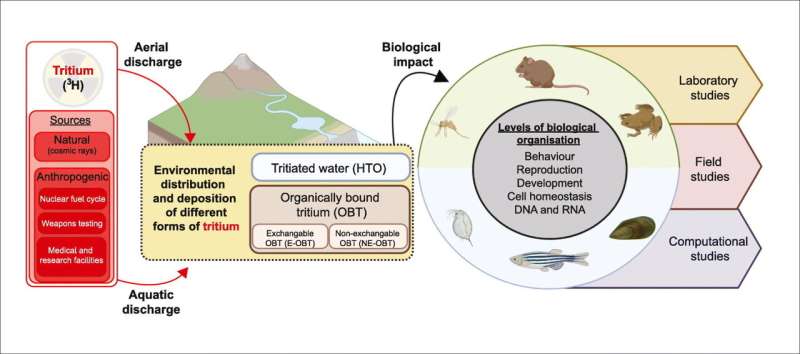This article has been reviewed according to Science X's editorial process and policies. Editors have highlighted the following attributes while ensuring the content's credibility:
fact-checked
peer-reviewed publication
trusted source
proofread
Scientists call for coordinated global effort to assess the full environmental impacts of tritium

Scientists have called for a coordinated international effort to fully assess the environmental impacts of tritium ahead of a significant expected rise in its global production.
A radioactive isotope of hydrogen, tritium is a by-product of the nuclear industry and its presence is predicted to grow exponentially with nuclear increasingly seen as being key to the global low carbon economy.
That will result in many nations having to develop long-term strategies to manage tritiated radioactive waste and develop tools to both assess and address its environmental impact.
However, writing in the journal Science of the Total Environment, scientists from the U.K. and France say its full potential impact is as yet unknown with studies to this point focusing predominantly on species of marine bivalves, fish and rodents.
Those studies have also centered on laboratory-based experiments and often been carried out using high concentrations of tritium unlikely to be found in the wider environment.
There has also been little consideration given to how a wide range of organisms uptake tritium through various routes, and whether they in turn pose sustained threats to human health through the food chain.
The researchers also say the tritium associated with steel and cement particles, arising from the decommissioning or dismantling of nuclear reactors, needs exploring further.
The study was conducted by researchers at the University of Plymouth and The French Alternative Energies and Atomic Energy Commission (CEA), who have collaborated for many years on studies assessing the impact of radioactive and chemical compounds in the environment.
In their conclusion, they say a coordinated and consistent focus is urgently needed to develop the evidence base required to minimize tritium's impact on everything from individual species to the environment as a whole.
Awadhesh Jha, Professor in Genetic Toxicology and Ecotoxicology at the University of Plymouth and the study's senior author, said, "Globally, tritium is produced and discharged in the environment in huge quantities when compared to other radioactive substances. Its importance is being further realized through development of fusion technology to ensure energy security without greenhouse gas emissions. Understanding its environmental behavior and impact on wild species, and any potential risk to humans via the food chain, has not been adequately evaluated to this point. The importance of doing so urgently cannot be underestimated."
Dr. Maria Florencia Ferreira, Postdoctoral Researcher and lead author, added, "After reviewing the available information on effects of tritium in non-human species, we identified various research gaps in the field. We have suggested future research directions in order to adequately assess the environmental impacts and the harmonized risk assessment of this important radionuclide."
The study was carried out as part of the TRANSAT (TRANSversal Actions for Tritium) project.
Dr. Christian Grisolia, from The French Alternative Energies and Atomic Energy Commission (CEA) and overall coordinator of the TRANSAT project, said, "One of the objectives of the TRANSAT project has been to evaluate the impact of tritium on human and non-human biota. This paper has showed the extent of our existing knowledge about tritium and its potential effects, and will help to fill the knowledge gaps as we move the science forward in a field of both scientific and economic importance."
More information: Maria Florencia Ferreira et al, Tritium: Its relevance, sources and impacts on non-human biota, Science of the Total Environment (2023). DOI: 10.1016/j.scitotenv.2023.162816
Journal information: Science of the Total Environment
Provided by University of Plymouth




















